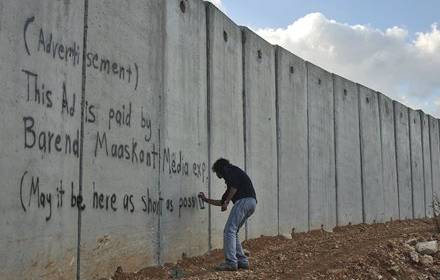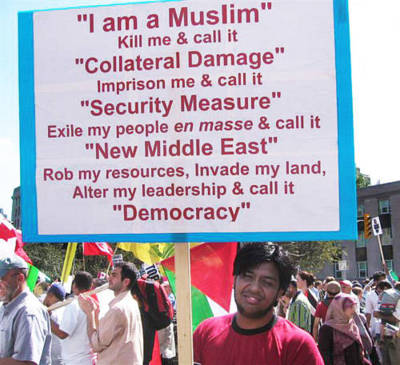A really interesting idea using the illegal Israeli barrier wall to support local Palestinian businesses…

Interesting bit of news from Harvard…
No men are allowed in the gym between 3 p.m. and 5 p.m. on Mondays, and between 8 a.m. and 10 a.m on Tuesdays and Thursdays. Even the staff during those times is all women.
The special hours allow the Muslim women, who adhere to traditional dress codes by covering their hair and most of their skin while in public, to dress more appropriately for exercising, said Susan Marine, director of the women’s center.
[Source: Yahoo News]
I understand how some people might find it a bit inconvenient at first, but I think it’s an interesting and good move towards mutual respect and trying to find a compromise so that everyone can use the campus facilities comfortably.
Came across this bit of news on BBC News today.
Saudi Arabia has become the latest to withdraw, following Iran, Lebanon, Yemen, Tunisia, Morocco and Algeria.
The Islamic Educational, Scientific and Cultural Organisation (Isesco) has also urged its 50 members to pull out from the fair, which starts on 14 March.
[…]
The organisers of the book fair have said their aim is to honour literature and promote dialogue between cultures.
… the Paris book fair is honouring 39 writers from Israel including well-known figures like David Grossman and Amos Oz.
What do you think?
Personally, I think boundaries and conflicts don’t apply to literature or art in general, they transcend origin, nationality, race, conflicts and everything to another level where we connect and appreciate each other and our works on the human level.
Still, I understand how it is viewed in another way especially when the organizers themselves add the origin factor into it all, and that the origin is Israel, in a time such as this, with tensions and problems at their highest, and peace at its farthest.
If it were up to me, I think it’s a time to be present rather than a time to boycott; in every situation: you can’t present your side of the story and defend it if you’re not there in the first place.
The problem is that we Muslims and Arabs are passive in the exact times we should be more present and proactive.
In response to written questions by the Washington Post, Barack Obama talks about a major speech, within his first 100 days of office, at a major Islamic forum, in which he’d redefine the US struggle and their relationship with the Muslim world:
[Source: Washington Post]
Just came across this bit of news from the Arab world:
The Arab League is to step up the fight against intellectual property (IP) theft, piracy and counterfeiting, which costs the Arab world up to $50 billion each year.[…]
In many countries across the region, over half of all software in use is believed to be counterfeit, and local attitudes to the concept of IP are said to contribute to the growing problem, with piracy still viewed by some as a harmless crime.
‘Arab World Protect 2008: The First Arab Consumer and Brand Protection Forum’, to be held in Jeddah in October, hopes to raise awareness of the economic ramifications, social costs and health and safety risks posed by piracy, and develop strategies to combat the problem.
[…]
According to the Business Software Alliance, software piracy rates in 2006 reached 84% in Algeria, 79% in Tunisia, 73% in Lebanon, 66% in Morocco, 63% in Egypt and 61% in Jordan.
In GCC countries, the rates stood at 64% for Kuwait, 62% for Oman, 60% for Bahrain, 58% for Qatar, and 52% for Saudi Arabia.
The UAE at 35% is the only country in the region at the average global piracy rate, and the only Arab country in a world list of 20 countries for the lowest piracy rates for 2006.
[Source: ArabianBusiness]
It’s true software piracy is a big problem in the Arab world, with many people viewing it as normal, mostly not even qualifying it as a crime, and even those who do think it’s a harmless one.
Still, words and condemnation are not enough, not even laws are enough, you can’t tell people not to buy pirated software and that they’ll be punished for it when they have no other way to get the software at an accessible price, especially if their jobs depend on it.
Governments in developing countries should negotiate lower software prices for businesses and individuals, free student licenses, and maybe encourage more use of free and open source software.
In short, people should be given reasonable options, and then if they leave them and keep going to piracy and breaking the law, they can be punished for it.
Interesting Gallup Poll results from Islamic World:
– 93% of Muslims Worldwide Condemn 9/11 Attacks; and most said the biggest obstacle to better relations with the West was the latter’s lack of respect for Islam.
– 0% Approve of Attacks on Religious Grounds. Among the seven percent who viewed the Sep 11 attacks as justified, not one gave religious justification for their views, instead expressing their fear of US plans for occupation and domination of the Muslim world.
– Substantial majorities in all Muslim countries said they supported bringing democratic principles to their own countries and admired the US primarily for its technological innovation and liberal democracy, but less than 50 percent believed the US was serious about bringing that democracy to the Islamic world.
Politics, not piety, differentiate moderates from radicals. Terrorism sympathisers don’t hate our freedom, they want our freedom.— Dalia Mogahed, executive director of the Gallup Center for Muslim studies
[Via: Pensito Review, Two Circles]
I posted on Twitter this morning about Fidel Castro’s resignation as president of Cuba and commander-in-chief of Cuba’s military.
I heard the news in the morning, and thought about posting it on the blog, but I didn’t really have much to say about it. It’s hard to really judge a person like Fidel Castro who is seen as a hero by so many people and a hated dictator by so many others; it’s obvious both sides have credible and real points; in the end, all I hope for is for things to get better for the Cuban people, whether it be from the sanctions or from his rule.
Anyway, what made me change my mind and write about it is this entry by Jon Swift, titled: Castro Resigns! Sanctions Work!
I just couldn’t believe the logic behind it; this person and several commenters on his blog actually think the US sanctions worked and that they were behind Fidel Castro finally giving up and resigning.
Just a few facts: The U.S. has been trying to get rid of Fidel Castro for 50 years now, 10 U.S. administrations have tried to topple him, there have been 638 assassination attempts against him, strict sanctions have been imposed on the country; and nothing worked.
To even suggest that the sanctions are what made Fidel Castro take this decision is unrealistic, laughable, and naive.
Plus, what about his decision is a victory for the U.S.?
I don’t think they were against Fidel as a person, but rather against his regime; will it make any difference under his brother Raul’s rule?
The man is only leaving because he’s a step away from the grave; he’s been seriously ill for a few years now; and everyone has been expecting to hear about him passing away anytime now.
Sanctions don’t work! Period!
All they do is ruin the lives of millions of citizens, while helping the rulers/dictators strengthen their grip on the country and make things even worse.
Sanctions haven’t worked in Cuba, they haven’t worked in Iraq, they didn’t work in Libya, they’re not working in Iran, nor are they working in Zimbabwe, …etc.
The US sanctions were/are a failure; Fidel Castro finally left of his own free will; after all he could have chosen to rule until his death.
“Does Israel have a right to exist?” people ask. What does that mean? Do countries really have rights, or do people have rights? The Jewish people have a right to exist, the Israeli people have a right to exist, but what does “Israel” mean? Israel defines itself as the state of the Jewish people. It is not a state of its citizens. It is a state of many people who are not its citizens, like myself, and is not the state of many people who are its citizens, like the 20 percent of its population that is Palestinian. So if we ask a Palestinian person, “Do you recognize the right for there to be a country on your historic homeland that explicitly excludes you?” what kind of response should we expect?
— The end of Israel? by Hannah Mermelstein; EI, 19 December 2007.
[Via: Lawrence of Cyberia]

[Source: Edge of Space]
[Via: you.presscue]
Interesting and important report from the World Bank on education in the Arab world…
[…]
It said that although education was becoming more accessible and the gender gap was being reduced, the region had not witnessed the positive changes seen in Asia and Latin America, particularly in literacy rates and enrolments in secondary schools and universities.
[…]
The report said unemployment in the Arab world averaged 14%, which is higher than other areas in the world, except Sub-Saharan Africa, with the Palestinian territories coming highest with nearly 26% percent.
[…]
The report concluded that Jordan and Kuwait were the top educational reformers in the region, while Djibouti, Yemen, Iraq and Morocco ranked lowest in terms of access, efficiency and quality of education.
Another study carried out in January by the Tunis-based Arab League Educational Cultural and Scientific Organisation found that 30% of the approximately 300 million people in the Arab World were illiterate.
[Full Report: World Bank Report]
[Source: BBC News]
I think it’s obvious that education should be the number one priority on every Arab country’s agenda, because without it, we’re really going nowhere.
How accessible education is and how many people make it into schools is very important of course, but it’s only the first step, the even bigger step is to have quality: a well built and structured curriculum, a highly qualified teaching staff, well-equipped schools and classrooms, more resources for the students …etc.
I think that in many Arab countries we’ve made big strides in reducing illiteracy and putting the necessary laws and procedures in place to get children to schools, but we still have a lot of work to do on pedagogy, curriculums, environment and more.
Our whole future lies in how well educated our future generations are; That’s how important education is.
[Via: The Black Iris]